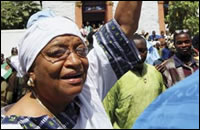Is the Political Terrain too Rough for Women in Africa?

 |
| Liberia's President Sirleaf Johnson |
Women face challenges like lack of finances, socio-cultural perceptions, lack of political commitment, and goodwill and general lack of infra structure, they even face challenges of dealing with propaganda war like it has been always alleged that several women sleep their way up the ladder. Unlike the man who might vie when he is single, a female counterpart will go through a rigorous criteria and criticisms. A woman plunging in to politics is still viewed as a misfit since politics in Africa still favour men to a greater extent.
Women have been stigmatised by the society and there is need for Africans to change their mindset about the role of a woman in the political landscape.
It should be noted that women are the pillars in any process that addresses sustainable development, security and human rights. Take the mediation process in Kenya for instance, only Sally Kosgey and Martha Karua (big names in successive regimes) were the ones representing women in the team, at the same time women at the grass root levels were not aware of what was going on, this is an issue various African governments should look at a little closer to ensure that women participate in policy making process and decision making process. It should be noted that the inclusion of women in politics is very important since their representation in sub-Saharan Africa parliaments is still low. In Kenya during the campaigns, all the presidential candidates promised 50 percent gender equity but all this ended as a mirage as few women managed to make it and very small fraction managed in the nomination process. In Kenyan 10th parliament the ratio of women to men is 1:12; this clearly indicates under-representation of women in the political sphere. In Ugandan parliament, women representation is 23.9 percent, Tanzania it is 28 percent while in Ethiopia the representation of women in August hose is below 10 percent. The impact of having such disproportionally male decision making institutions can be observed in unwillingness to respond to women’s developmental needs. This is because the few women present will be unable to push for a motion to go through due to lack of quorum. For instance, it was until 2004 that Kenya began having a national policy on women. Women's limited participation in economic and political decision-making bodies can be attributed to inadequate institutional mechanisms to advance the status of women.
Since changes in society normally come through the political process, the need for women to be among those who make policies and decisions at all levels of government is critical if their plight has to be adequately addressed.
However in the recent years, some African women have made significant electoral gains in the levels of decision-making. Prominent women leaders include the Deputy President of South Africa, Ms. Phumzile Mlambo-Ngcuka, and the Prime Minister of Mozambique, Ms. Luisa Diogo. While some have served as acting presidents in both Burundi and Guinea-Bissau, the 2006 election of Ellen Johnson Sirleaf as President of Liberia is, perhaps, the most significant milestone for women at the highest levels of politics in Africa. Women should continue to overcome new challenges to strengthen their power and position even though the political opportunity is still slim. While, their presence alone does not guarantee change for women, it allows them to demonstrate sound political leadership, an awareness of women’s needs and the importance of gender equality, all of which will open doors for the next generation of women leaders.
Mainstreaming gender should be the core of institutional mechanisms especially at government level, to avoid marginalisation of women's issues in one place, while conditions for an effective function of a national machinery as highlighted in the Beijing Platform for Action should include location at the highest possible level in the government, falling under the responsibility of a cabinet minister; institutional mechanism of a process that facilitates, as appropriate, decentralised planning, implementation and monitoring with a view to involving non-governmental organisations and community organisations from the grass roots levels.
Based on a strong political commitment, national machineries should be created, where they do not exist, and strengthened, as appropriate, machineries, for the advancement of women at the highest possible level of government. The governments should also carry regular reviews on how women benefit from public sector expenditures to ensure equality of access to public sector expenditures, both for enhancing productive capacity and for meeting social needs and achieve gender-related commitments.
It is still difficult for a woman to gain access to power or to exercise the same as men have made sure they have dominated the field. Men usually resort to primitive means of dealing with women they feel are posing as political threat to them by hiring goons to beat up these women. There is a need to promote the increased participation of women as both active agents and beneficiaries of the development process, which would result in an improvement in the quality of life for all.
